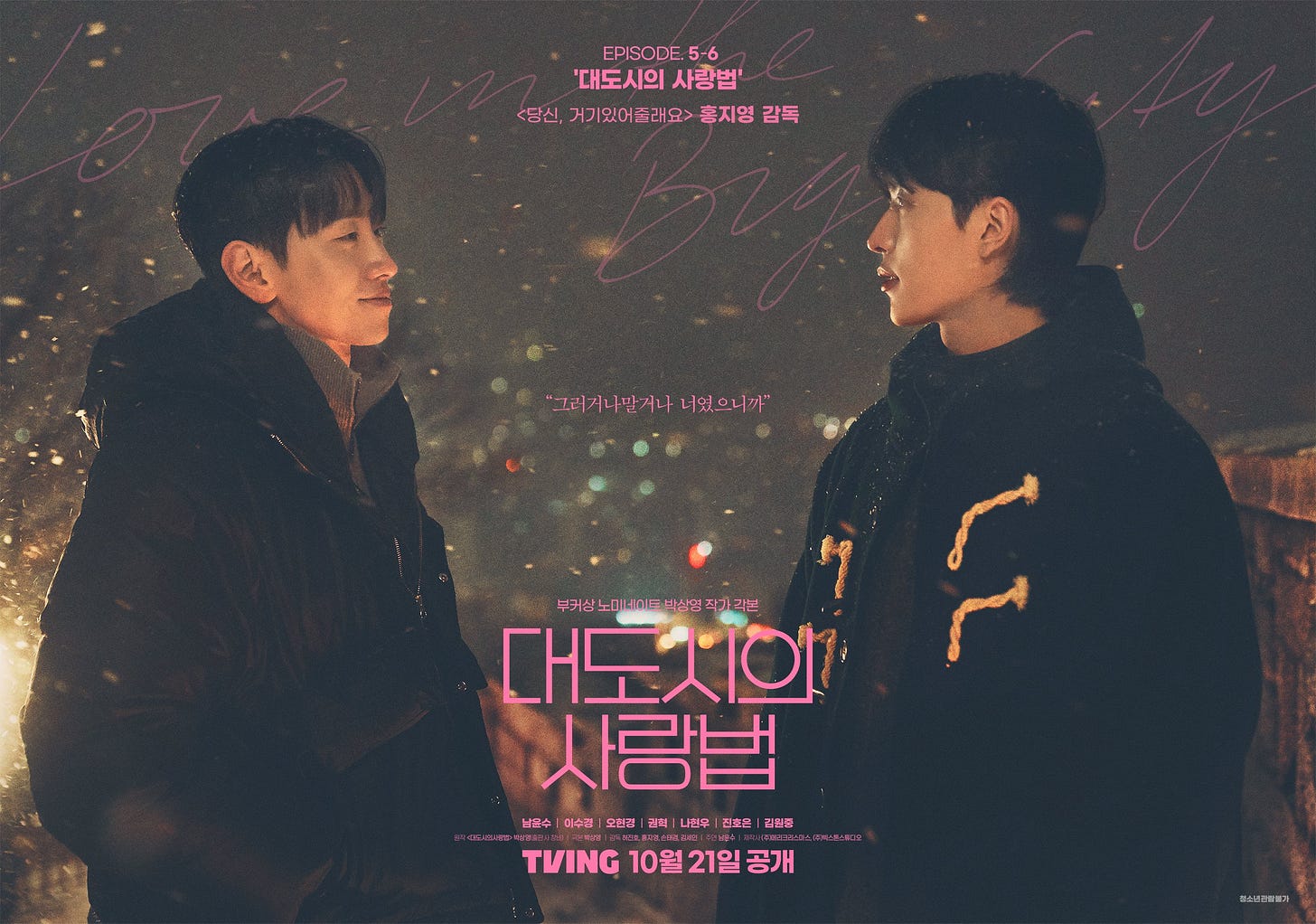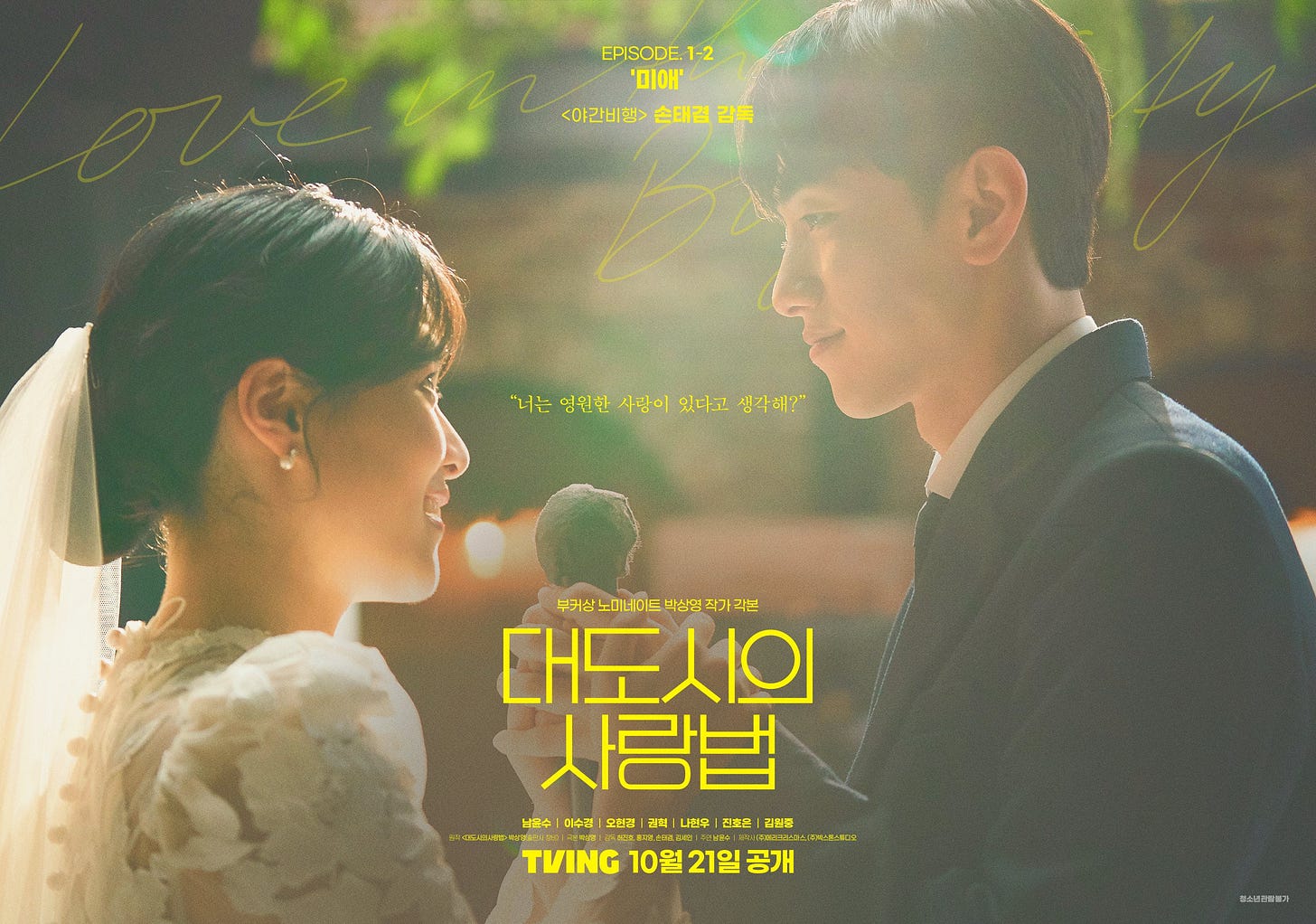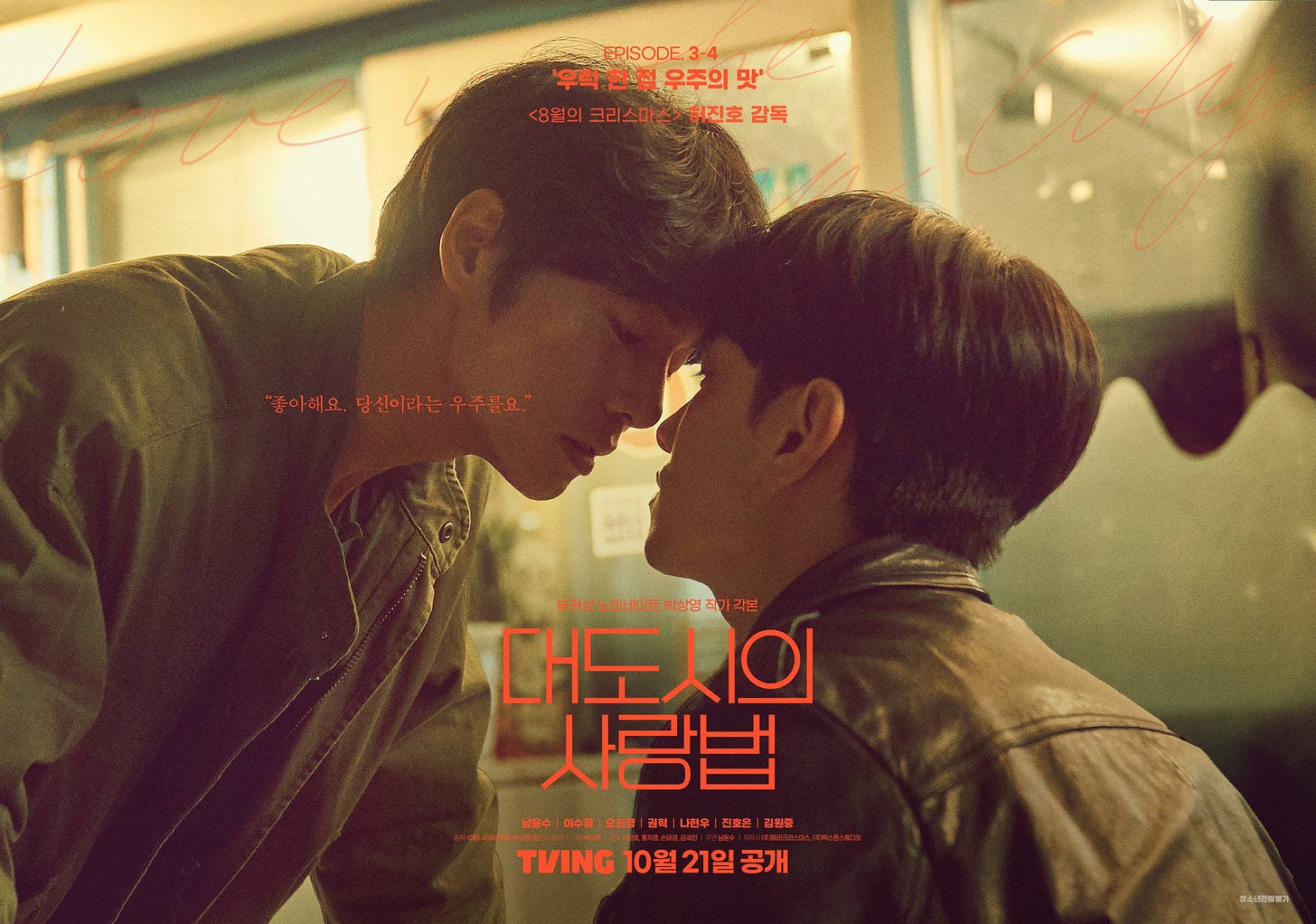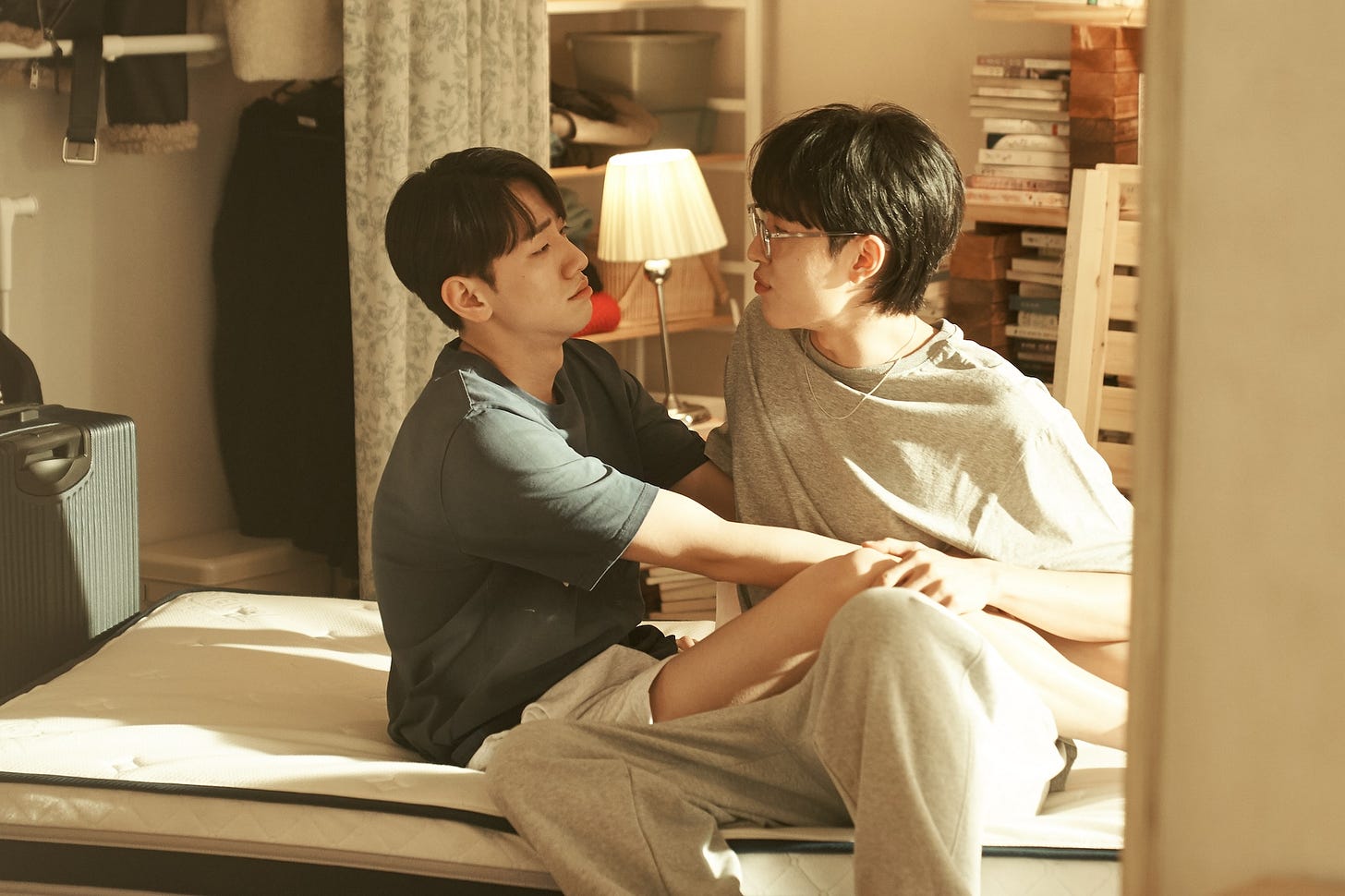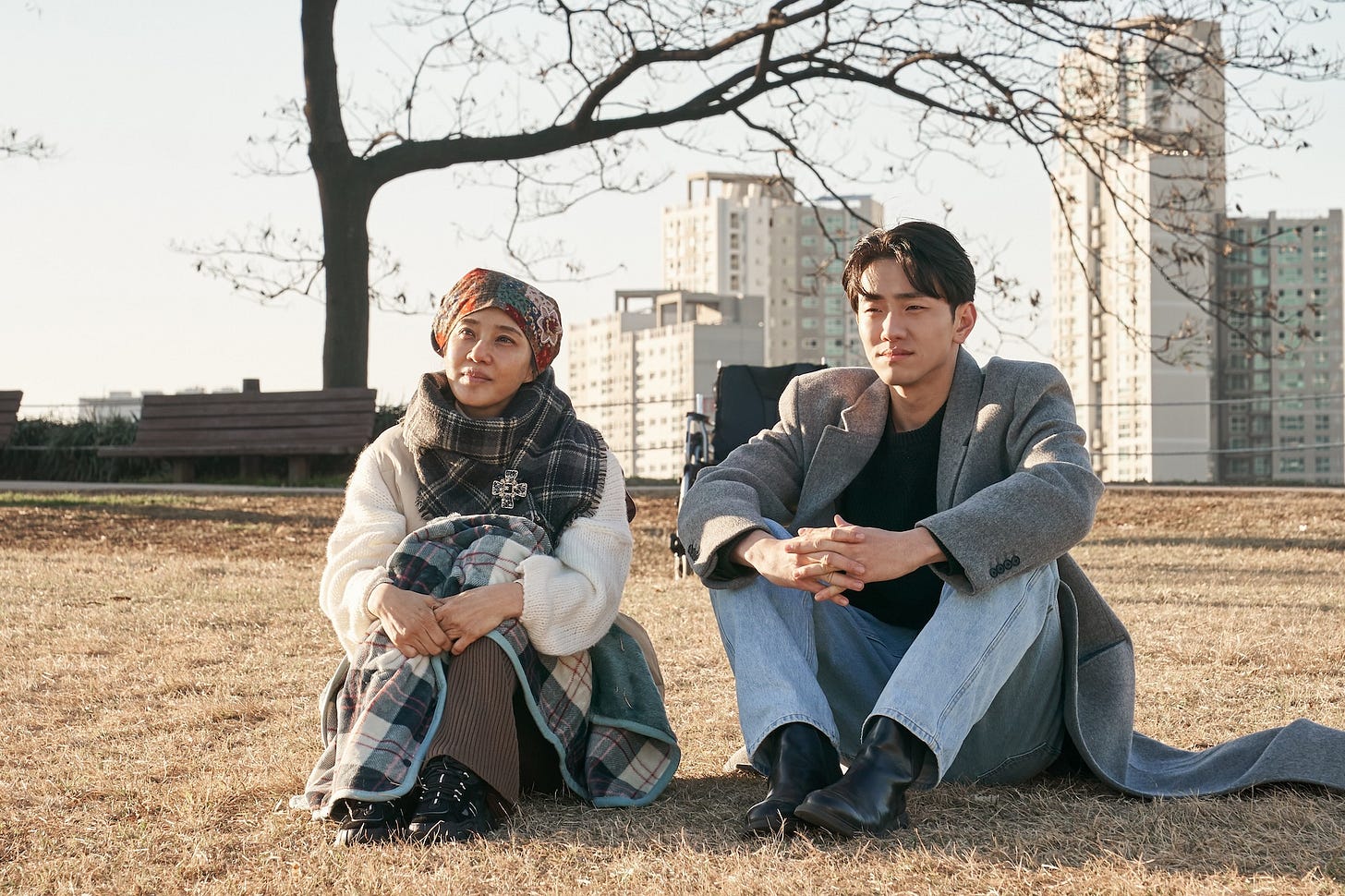Love in the Big City: Queering the K-Drama
The series adaptation of Sang Young Park's novel uses mainstream romance tropes to tell a deeply queer story
Spoilers for the drama series Love in the Big City, and to some extent, the novel by Sang Young Park. I have yet to see the film, but I would love a screener!
In the first episode of TVING’s Love in the Big City, we meet Nam Yoon Su’s somewhat directionless, partying gay college student Go Young in bed with another man, and then on his way to work. Go Young arrives late and unshowered, having stayed for a morning quickie with his hookup from the night before, only to discover the guy was already in a relationship. Kwon Hyuk’s older, intense, and more forwardly gay fashion photographer Kim Nam-Gyu is annoyed at the lack of professionalism, but he can’t argue with the results: Go Young isn’t even a model, but he’s a natural on camera. There’s an intensity between the two of them, and even before they inevitably meet up again later at a gay club, it’s clear that this is some kind of grumpy-sunshine meet cute. On just about any other show, including other BLs, this would be our OTP, our leading couple. On Love in the Big City, however, this is just one of half a dozen men we see Go Young with during a show that spans a decade and ends with him single.
You would be forgiven for being surprised by this. After all, it doesn’t follow the typical romance formula. LITBC’s trailer, which came under fire from homophobic zealots and was removed from official sites, hinted at multiple love interests but leaned on typical K-drama tropes like lovers sharing an umbrella. There’s a sweetness to the trailer that certainly exists in the series, but the steaminess, sense of humor, and more prickly aspects of the story remained under wraps. This allowed viewers who aren’t queer, weren’t familiar with the book, or don’t typically watch BLs, to view LITBC as a typical K-drama that just so happened to have a gay romance: high production value, great actors and directors, and heart-fluttering chemistry. While all of that is true, Love in the Big City isn’t a gay romance by coincidence, or a straight romance where one character’s gender was swapped out. It’s a deeply queer story written by a gay man, and as such, it challenges cishet viewers and is a balm for many of the queer folks who will recognize some aspect of themselves in it. LITBC uses the tropes, structure, and marketing of a typical K-drama to Trojan horse a deeply queer series onto South Korean streaming.
Not all shows depicting LGBTQ people are inherently queer media. For example, tokenization refers to the inclusion of someone from a minoritized identity in a stereotypical or simply not fully realized manner. There is no one test to determine if a piece of media as a whole (as opposed to just a character or individual storyline) is queer, but drawing on the principles of queer theory, we look for shows and movies that push back on heteronormative expectations of life paths, family structures, and romantic and/or sexual relationships. Another key sign is deconstructing binary, sex-based notions of gender. From a meta standpoint, queering media can also involve playing with the very structure of narrative and storytelling. The series Love in the Big City does all of those, and then some.
By somewhat restructuring how the timeline of the book is presented, LITBC shows each relationship in the present tense, which works better in this format to allow viewers to connect with the characters and the story. Instead of following typical romance k-drama story beats, LITBC prioritizes Go Young’s personal journey over any one love interest, even if there are (understandable!) fan favorites. Unlike most romance-oriented dramas, LITBC doesn’t rely on having two main couples, or even a main couple and a larger ensemble. Nam Yoon Su’s Go Young is the lead, with his trio of friends serving as something of a gay Greek chorus, and his various romantic and sexual prospects delineating the show into four shorter arcs. There’s a general resistance to the Noah’s Ark-level pairing off that populates most cishetero stories, from Shakespeare to K-dramas. None of the gay friends end up together, and the one who gets engaged (to San Yawn of Balming Tiger, in an entertaining cameo) later ends up single. This is an important, and deeply queer message: coupling and marriage are not the ultimate goal for everyone—or even a possibility, as Korea does not provide for gay marriage.
There’s a major shift in tone after the first two bright, frothy episodes, to the point where the opening credits feels almost jarring. Gone are the silly sound effects and slapstick sequences played for laughs, like Mi Ae fighting in a police station. From this point forward, the show is a grounded drama more akin to Something in the Rain or Nevertheless, which features a sapphic couple in its ensemble, in addition to a frank depiction of modern sex and relationships. This tonal shift allows LITBC to more comfortably cover topics like caring for an ailing parent, grief, illness, suicidality, and homophobia, while remaining very much a slice of life show, full of fun nights out, banter among friends, and all the beautiful little textures of knowing someone for years.
A Refreshingly Modern Drama
From the opening scene, LITBC isn’t shy about Go Young’s sex life, which is a major aspect of the book. The show brings far more heat than your average romance drama, again coming closer to grounded contemporary shows focused on young people, like Nevertheless and The Fabulous, which both opened with their main characters having one night stands. LITBC is still more frank than both, with characters discussing sexual preferences like penis size, positions, topping vs bottoming, the use of condoms, and other topics that are common in daily life, but rare to hear on Korean television. The sex is at times loving, frantic, angry, or even mournful. It feels real in a way that’s a huge departure from the chaste back hugs and mannequin-stiff, closed-mouth kisses on some straight dramas. Infantilizing and de-sexualizing LGBTQ characters on screen is a global media problem, so allowing the characters the fullness of their humanity and honoring the source material is important.
LITBC is a fantastic show not simply for realistically depicting queer sex and romance, but for the way it engages with topics that impact queer lives, like (internalized) homophobia, femme-phobia & toxic masculinity, religious trauma, and the importance of found family. LITBC shows a clear link between misogyny and homophobia and stands as a joyous and loving rejoinder to them both, in the form of the characters Go Young and Mi Ae. The pair are brought together by the fact that they live outside the norms of traditional Korean society. Rather than either of them choosing to take advantage of the other’s vulnerability to ways that their classmates or Seoul at large would deal with them harshly, both choose solidarity and loyalty, and in that, they find a deeply loving friendship.
Mi Ae doesn’t tell anyone that Go Young is gay, even though she is essentially a social pariah. Go Young hears his so-called friends gossiping and slut-shaming Mi Ae, and rather than laughing along or even remaining silent, he calls them out. LITBC links the classmates’ misogyny and homophobia. While Go Young and Mi Ae could have each had a temporary reprieve by stepping on the other, eventually, their classmates would have gone back to treating them poorly again.
Living together provides safety for Mi Ae and a much-needed reprieve from his mother’s repressive religious household for Go Young. Later, it’s Go Young who helps Mi Ae access, pay for, and recover from her abortion. No matter what the world throws at them, they have each other; at least until she gets married. Mi Ae is still an important part of Go Young’s life after that, but her husband becomes her closest tie, her primary obligation, and while she still chafes under societal norms, there’s no question that Go Young lives further outside of them than she does.
Internalized Homophobia and Femme-phobia
Over the course of Go Young’s various liaisons, LITBC explores varying degrees of internalized homophobia, femme-phobia, and toxic masculinity within the LGBTQ community. One of the most profound and heartbreaking themes, we see a love interest that secretly writes extremist Christian homophobic think tank propaganda who denies the nature of their relationship repeatedly and another who is closeted, with a wife and family back home in Japan. Even those who seem to be as much or even more “out” as Go Young, like the Instagram influencer, are not immune from femme-phobia and toxic masculinity. He breaks up with Go Young by complaining about his singing in the streets, dancing (to girl group music), kissing when drunk in public, and crying, AKA being too emotional.
Femme qualities are inherently tied to internalized homophobia and the closet, particularly where it’s less safe to be completely out, all the time. After all, being out isn’t a binary state, either. Go Young is out with Mi Ae, but not her boyfriend—at least, not until she outed him, an unfortunate but important reminder of the limits of solidarity. He’s out when he’s inside the gay clubs of Jongno-gu and Itaewon, but didn’t mean to be when he saw a cishet classmate outside on the street. Far too often, Go Young keeps having to essentially ask these guys, “Are you embarrassed of me?” The truth is, they're embarrassed of themselves, of being seen as femme, of breaking gender norms, of not only being gay, but being the wrong kind of gay.
Toggling between these varying degrees of openness, these varying abilities to be one’s true self, is exhausting but sadly necessary for safety and survival. But LITBC challenges Go Young and all of its LGBTQ characters to consider the line between survival and self-harm, between safety and letting your own pain turn into a weapon you wield against others like you. It’s the kind of nuanced storyline that makes it obvious that both the book and the show were written by a gay man, the novelist Sang Young Park. Frankly, a cishet person simply wouldn’t have the range.
Young-soo, the philosophy classmate/fish enthusiast, denies his own homosexuality and pretends there’s nothing more between him and Go Young while he both a) has sex with him and b) writes treatises about the sin of homosexuality. It takes a while for that to be revealed, but there are hints. He doesn’t want matching “couple look” shirts, he judges Go Young’s spending, he distances himself from Go Young in front of his own friends, and he won’t even let Go Young take a picture of them alone in his house.
A particularly contentious scene in Young-soo's apartment, unfolds:
Young-Soo: “Everyone stares when we wall past”
Go Young: “Do you only want to meet privately?”
Young-Soo: “Yes”
The song playing is Lee Eun Ha’s “I Think It'll Be a Waste of Time,” and it becomes the pair’s theme.
Self-acceptance and Found Family
Thankfully, Go Young grows in his confidence and self-acceptance over the years depicted. In the first two episodes, he is self-conscious about the photographer Kim Nam-Gyu showing mild forms of affection like hugging, doing a love lock, and wearing couple rings. Sure, some of that is about the photographer wanting such a serious relationship so soon, but at that point, Go Young clearly wouldn’t be comfortable doing that with any guy just yet. His greater comfort at expressing himself around the Instagram influencer is at least partially Nam Gyu’s influence.
A year after the breakup, when Yeong-soo sends comments on Go Young’s next manuscript, he has the sense of self preservation to throw it in the garbage without reading it. By the time we see the relationship with bartender/nurse Sim Gyu-ho, Go Young allows himself to openly enjoy couple look t-shirts and holding hands. He isn’t uncomfortable introducing his boyfriend to his friends, nor is Gyu-ho embarrassed of Go Young’s interests or behavior. He even discloses his HIV+ status, something Gyu-ho takes in stride, because he loves Go Young, and that’s all that matters to him. While the relationship with Habibi is last chronologically, Go Young views it through the lens of the more open, loving and supportive one with Gyu-ho, and so, we do as well.
Still, LITBC does not close with Go Young with Gyu-ho, or with any romantic relationship at all. A major theme is the importance of found family, a bedrock concept of modern queer life. Go Young bonds with several other characters over their difficult relationships with their families of origin, something all too common for LGBTQ people and others who don’t follow traditional paths. In Go Young’s case, his is tied up in religious trauma as well, with his mother, a Deacon, catching him making out with another boy as a teenager and sending him away to a Korean equivalent of conversion therapy. (The book goes into greater detail, and follows the medical model for “rehabilitation” rather than a religious one.)
While for some the question of family may be cut and dry—they’re the only one you’ve got, so you must always forgive them, or they don’t embrace and support you, so you must cut them off—for Go Young, it’s not so clear. His mother clearly disapproves of him being gay and likes to pretend she doesn’t know, continually mentioning fixing him up with a woman. But he wants her acceptance, hoping to introduce her to Yeong-soo. When she dies, the grief is very real, though layered with a grief for what their relationship could have been, and a strange sense of freedom, now that there’s no one he has to please or pretend for.
For Go Young, while he still loves his mother and very much literally cares for her, it’s Mi Ae and his friends Eun-su, Ji Tae, and Ho Min who are there for him through thick and thin. He can be most himself around them, whether singing T-ara at karaoke or messing around in a restaurant. Like any family, they are not perfect - Mi Ae outed Go Young to her boyfriend, and the guys don’t know about Kylie, as he calls his HIV status—and with good reason. One of them makes a nasty, fear-mongering joke about covering their drinks so they don’t catch it when someone he believes to be HIV+ passes by. If there ends up being a season 2, I hope Go Young finds a way to tell them while also holding them accountable for adding to the stigma surrounding HIV. And yet, for more than a decade, they are there for him and each other.
As the show positions the finale, Go Young’s happy ending is not finding the one and being paired off. It’s learning from his past, valuing love, and surrounding himself with people he loves and who loves him in return, in whatever form. There is a feeling that while he is not with Gyu-ho or anyone else, he learned from that relationship just like he learned from photographer Kim Nam Gyu, and he will be more open and honest in the next one. He accepts himself more, and he prioritizes a partner who loves and accepts him as well. Having experienced what it feels like to truly be yourself and to be loved for it, he’s done with the Yeong-soos and even the Habibis of the world. There’s no going back, only forward, surrounded by his people.






